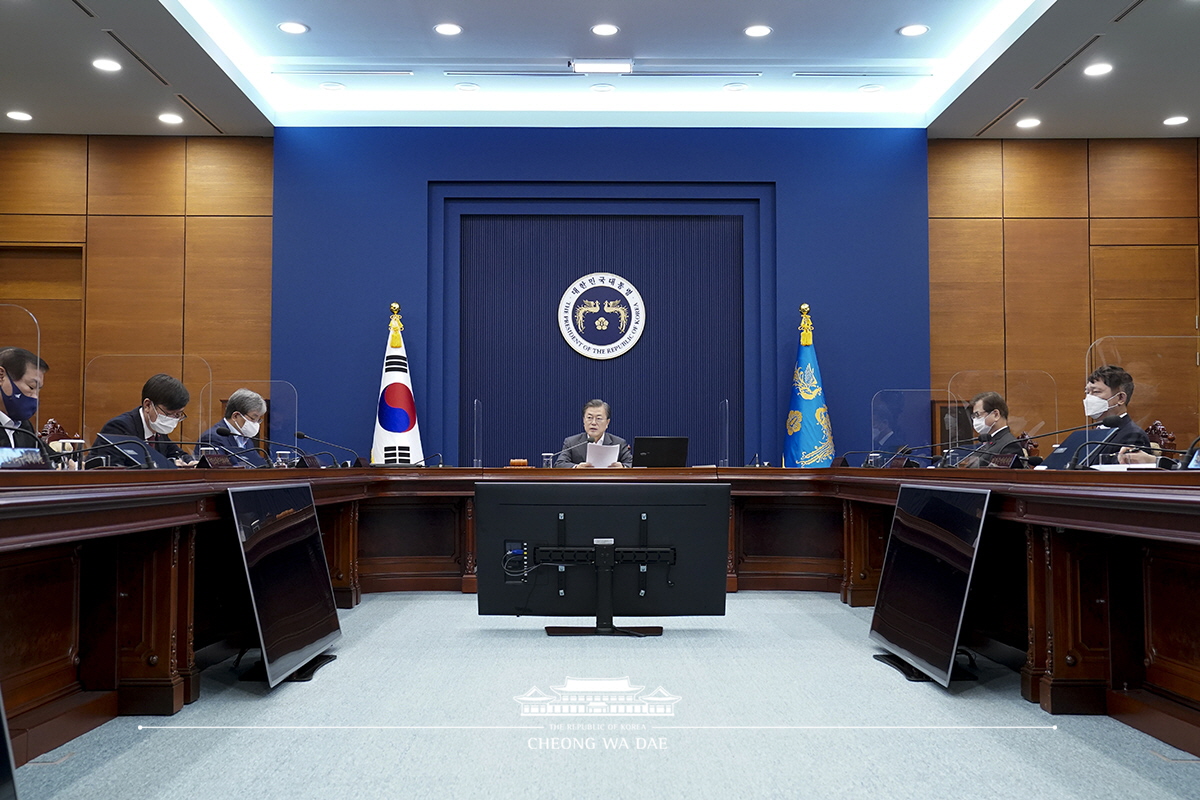이 웹사이트는 제19대 대통령 임기 종료에 따라 대통령기록관이 「대통령기록물 관리에 관한 법률」에 의해 이관받아 서비스하는 대통령기록물입니다. 자료의 열람만 가능하며 수정 · 추가 · 삭제는 불가능합니다.
다만, 「개인정보보호법」에 의하여 개인의 정보를 보호받기 원하시는 분은 관련 내용(요청자, 요청내용, 연락처, 글위치)을 대통령 웹기록물 담당자(044-211-2253)에게 요청해 주시면 신속히 검토하여 조치해 드리겠습니다. 감사합니다.
SPEECHES & REMARKS
BRIEFINGS

Let me begin the 61st Cabinet Meeting.
The reform laws laboriously legislated by the National Assembly for law-enforcement agencies – the Corruption Investigation Office for High-Ranking Officials, the police and the National Intelligence Agency – will be promulgated after today’s Cabinet Meeting. The codification of these institutional reforms, the long-awaited goal of Korea’s democracy, has finally been completed. It is a truly historic milestone for our people, who have long witnessed law enforcement agencies impairing democracy and violating human rights. I, too, am filled with deep emotions as I can keep my promise to the people. These reforms lay a cornerstone to ensure that all law enforcement agencies will work on the principle of checks and balances and that they will be reborn as organizations that serve the people exclusively.
Importantly, the Corruption Investigation Office for High-Ranking Officials, or CIO, can be seen as the crux of these reforms. In many cases, laws have not been applied fairly. There have been sanctuaries, privileges and optionally applied justice. Since the Chun Doo-hwan Administration, previous governments have been tarnished by power-induced corruption and irregularities involving Presidents themselves, their relatives or others with special interests. At every such occurrence, a strong need emerged for a special investigative organization – one which would be thoroughly guaranteed political independence and neutrality.
In 1996, a civic group filed a legislative petition after collecting signatures from 151 lawmakers following the disclosure of slush funds tied to the Chun Doo-hwan and Roh Tae-woo administrations. This paved the way for discussing the establishment of an agency to investigate corruption among high-level officials. The Kim Dae-jung Administration began government-level discussions in earnest through the Presidential Committee on Judicial Reform. In the 2002 presidential election campaign, then presidential candidate Roh Moo-hyun proposed establishing such an agency as one of the key pledges of his anti-corruption policy. After being elected, he pushed for the enactment of a relevant law. If the CIO had been founded back then, it could have played a great role in curbing the corruption of ensuing administrations.
I also pledged to launch a similar corruption investigation agency for high-ranking officials not only in the last presidential election but also in 2012. Had such an agency been established at that time, the Park Geun-hye Administration’s influence-peddling scandal involving state affairs might not have occurred. There is no “if” in history. Regardless, that was a lamentable chapter.
As such, the establishment of the CIO has been discussed and pursued for over 20 years as part of the efforts to build a just country free of corruption. It is neither a matter of ideology nor party affiliation – by any means. The Grand National Party, predecessor of the current main opposition party, made the launch of a similar investigative agency a part of its 2004 general election pledge as well, and some leading figures among the opposition parties who now oppose the launch of the CIO once actively advocated it in the past.
Now they even claim that the CIO is a means for dictatorship. Its launch is about creating yet another body to investigate any administration’s influence peddling, but their attempts to link it to dictatorial rule defy common sense. If we want to see our society become more upright with corruption-free powers that allow no one to be beyond criminal investigation, I believe it is necessary to join forces regardless of party affiliation to ensure that the CIO can play its proper role while thoroughly upholding political neutrality.
Meanwhile, the CIO also carries added significance as a means of democratic control over the Prosecution Service. The prosecution has so far been subject to public criticism that it has not taken responsibility for its own wrongdoing despite its unfettered authority and that it has become a safe haven that repels all attempts to hold its members accountable.
The CIO can be an institutional mechanism that can strictly hold the Prosecution Service accountable for any corruption and wrongdoing within it. There has never been such a mechanism until now.
No law enforcement agency can reign over the people. If the principle of checks and balances can bring the Prosecution Service under democratic control, this will serve as an opportunity for it to shed the criticism that it is an unfettered power and be reborn as a sounder, more trusted organization that serves the people.
The CIO is not a monstrous organization designed to undermine the Prosecution Service’s authority. No more than 25 prosecutors and 40 investigators can staff the CIO, and that number is by no means comparable to the Prosecution Service, which currently employs 2,300 prosecutors alone. Even after the launch of the CIO, the Prosecution Service’s authority will remain formidable. The Prosecution Service’s mighty authority can be a force that protects justice in our society. The people merely believe that its authority requires checks as well. I sincerely hope that the Prosecution Service will accept that point.
The CIO will officially launch when the procedures for nominating its head and holding a hearing are concluded. Above all, political neutrality is vital for the CIO. It is also important to keep the CIO neutral and independent from the Prosecution Service. Everyone’s efforts are needed to ensure the neutral operation of the CIO. Everyone, not only those from the CIO but also from political circles, the Prosecution Service, media companies and civil society, should work together to monitor its operations. I also ask the people to provide support so that the CIO can become an organization that serves the public – one that advances our democracy a step further.
Thank you.



